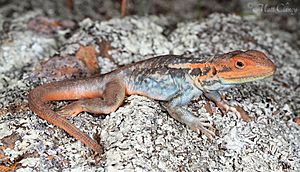Ctenophorus decresii facts for kids
Quick facts for kids Ctenophorus decresii |
|
|---|---|
 |
|
| Photograph of a tawny dragon | |
| Conservation status | |
| Scientific classification |
|
| Kingdom: | Animalia |
| Phylum: | Chordata |
| Class: | Reptilia |
| Order: | Squamata |
| Suborder: | Iguania |
| Family: | Agamidae |
| Genus: | Ctenophorus |
| Species: |
C. decresii
|
| Binomial name | |
| Ctenophorus decresii (A.M.C. Duméril & Bibron, 1837)
|
|
| Script error: The function "autoWithCaption" does not exist. | |
| Synonyms | |
Script error: No such module "Check for conflicting parameters".
The tawny crevice-dragon or tawny dragon (scientific name: Ctenophorus decresii) is a type of lizard. It belongs to the family of lizards called Agamidae. This lizard is found only in Australia, meaning it is endemic there.
Contents
What's in a Name?
The scientific name decresii comes from L'Île de Decrès. This was the French name for Kangaroo Island back in 1837. So, the lizard is named after a place.
Dragon Family Tree
The tawny dragon is part of the Ctenophorus genus. This is a very diverse group of lizards. They are all found across Australia.
These lizards show sexual dimorphism. This means males and females look different. You can tell them apart by their neck and body colors. Males have distinct colors compared to females and younger lizards.
Where Tawny Dragons Live
You can usually find C. decresii in rocky areas. These lizards live in several different places across Australia. Scientists have found that lizards from different areas are slightly different. They call these groups "lineages" because they are geographically separated.
There are three main groups:
- The northern lineage
- The southern lineage
- The NSW (New South Wales) lineage
All Ctenophorus lizards have a similar body shape. This shape helps them survive in Australia's climate.
Amazing Color Changes
Ctenophorus decresii lizards are known for their varied throat colors. This is called polymorphism. Their throats can be grey, white, yellow, orange, blue, or even bright red. Some lizards even have multiple colors!
This color variety comes from the different places they live. For example, a certain throat color might be best for lizards in South Australia. A different color might be better for those in New South Wales.
How Colors Are Different
Even with many colors, the throat colors fall into clear groups. This means the colors are "discrete." You can put each lizard into a specific color category. There are not many lizards with "in-between" colors.
Scientists used special methods to sort the colors. They looked at how grainy the colors were and how they stood out. They found that lizards within each color group were very similar.
Passing Colors Down
Because throat color is a clear, discrete trait, it is highly heritable. This means it can be easily passed down from parents to their offspring. This is why these different colors have stayed in the species for many generations. Young lizards will often have the same or similar colors as their parents.
Why Different Colors Survive
The different throat colors of C. decresii might be due to two things:
- Sexual selection (choosing mates)
- Natural selection (survival of the fittest)
Tawny dragon throat colors can be put into two main groups: dull and bright.
- Dull-colored throats: These lizards are harder for predators, like birds, to see. This helps them avoid being eaten and live longer. So, this trait became common in some lizard groups.
- Bright-colored throats: These bright colors attract more female lizards. This means bright-throated males are more likely to have babies. Even though bright colors might make them easier for predators to spot, they help with mating success.
Both dull and bright throat colors offer different advantages. This is why both types of colors have continued to exist in the species. Each color helps the lizard in a different way to survive and reproduce.
Images for kids
 | Roy Wilkins |
 | John Lewis |
 | Linda Carol Brown |



